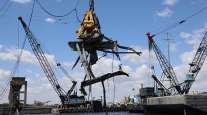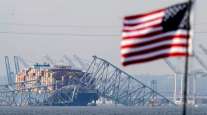CSX Pulls Support for Baltimore Tunnel Renovation

Federal and state lawmakers from Maryland expressed frustration at a decision from CSX Corp. to withdraw its support to fund the renovation of the Howard Street Tunnel near the Port of Baltimore, dealing another blow to the long-awaited project that would allow double-stack trains.
The 122-year-old tunnel is too short in certain spots to handle the intermodal trains unless they’re single stacked, particularly in the westbound direction.
The total cost of about $425 million would’ve been split between CSX, the Maryland Department of Transportation and the U.S. Department of Transportation. Upon the news, Maryland withdrew its request for a $155 million federal grant to fund the project.
The Maryland Port Administration has lobbied strongly for the project to keep the Port of Baltimore competitive with the Port of New York and New Jersey and the Port of Virginia, especially as international steamship lines begin to send Neopanamax vessels to the East Coast.
Through double stacking, trains can transport more containers per trip and therefore lower the costs to the steamship lines and ultimately the beneficial cargo owners importing merchandise from overseas.

Hogan, who spoke with reporters on a CSX train in October 2016 about the Howard Street Tunnel renovation, called the railroad's decision to withdraw funding "deeply disappointing." (Patrick Semansky/Associated Press)
However, CSX has gone through a major transformation this year with Hunter Harrison appointed as CEO through a proxy battle. With his arrival, Harrison brought his Precision Scheduled Railroad concept, significantly revamping the intermodal network by eliminating certain underutilized lanes and emphasizing other high-demand corridors. In his cost-conscious efforts, the Howard Street Tunnel project became expendable.
“Given the operating changes that CSX’s new leadership team has made over the last several months, and upon an updated evaluation, we determined that the Howard Street Tunnel project proposal no longer justifies the level of investment required from CSX and our public partners at this time,” CSX spokesman Christopher Smith said. “Intermodal is an important part of CSX’s business and we are committed to supporting the freight rail needs of our customers and the Port of Baltimore through frequent, reliable, on-dock service.”
Maryland’s congressional delegation, however, sent a letter to the railroad expressing disappointment with the decision.
“We seek to understand how a project that has been a top priority for CSX, multiple local, state and federal representatives and the business community for many years — to the exclusion of other local needs and projects — is suddenly no longer of importance to CSX,” the delegation stated in the Nov. 1 letter.
It also stated, “With freight volumes expected to increase dramatically over the coming decades, it is critical that necessary infrastructure and safety improvements are made to protect the public and prevent a rail bottleneck that impacts the movement of commercial goods up and down the East Coast and from Baltimore to Ohio.”
Pete Rahn, the state’s top transportation official, called the decision “surprising and incredibly troubling” given the countless hours spent on the effort, in his letter to U.S. Transportation Secretary Elaine Chao.
Through a spokeswoman, Maryland Gov. Larry Hogan added that the decision was “deeply disappointing.” Nevertheless, CSX addressed Hogan in its statement on the issue.
“This business decision is in no way a reflection on the leadership of Governor Hogan, who has supported this initiative to the greatest degree possible on behalf of the businesses and citizens of Maryland. CSX appreciates the partnership we have developed with the state and we look forward to continuing the dialogue with our partners about our new operating plan,” it stated.
In 2016, the federal government did not select the Howard Street Tunnel project for funding under the FASTLANE (Fostering Advancements in Shipping and Transportation) program, but the state reapplied earlier this year for a grant under the INFRA (Infrastructure for Rebuilding America) program.




